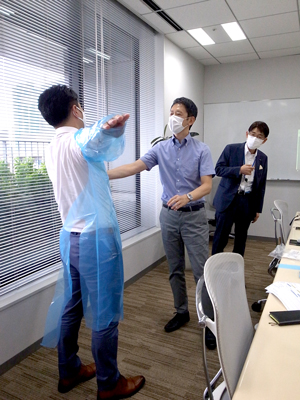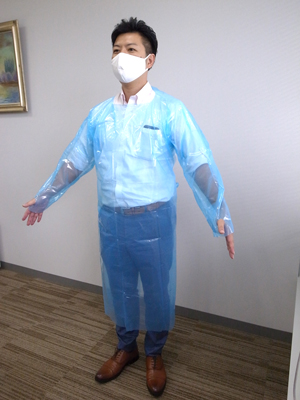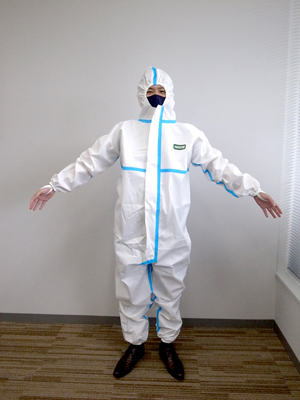100 Stories2020 Emergency Measures Requested by the Japanese Government
The Asahi Kasei Group's response to COVD-19 was not limited to ventilators, apheresis therapy, virus removal filters, and pharmaceuticals provided in the healthcare sector. The Group also provided a variety of materials such as medical gowns and masks using Spunbond nonwoven fabric and disinfectant wipes using cellulose nonwoven fabric.
On April 7, 2020, former Japanese Prime Minister Shinzo Abe declared a state of emergency in seven prefectures, including Tokyo and Osaka. Just before this, Asahi Kasei was approached by the government. The March 25 announcement of ZOLL's increased production of ventilators caught the attention of government officials, leading to a request for the supply of medical equipment and materials such as medical gowns and protective clothing.
Asahi Kasei Advance, a trading firm within the Group, was called upon to help alleviate the demand for these materials.
Asahi Kasei Advance immediately set about procuring medical gowns. However, while Asahi Kasei does manufacture Spunbond nonwoven fabric, which is used as a surface material for medical gowns and protective clothing, the Group does not manufacture final products. Moreover, the supply-demand balance for domestically produced products was already tight, and they did not have time to stick strictly to Asahi Kasei's materials, so they turned to external sources. In the hurried search for fabric exporters overseas, they received a call from the Thailand headquarters of Advance.
The company, which normally produces poncho-shaped raincoats and other motorcycle gear, had switched production to poncho-shaped plastic gowns in response to the international spread of infection and was exporting them to Western countries. They learned that a portion of the products could be sold to Japan.
Five days after the government's announcement of emergency measures, samples of the plastic gowns from Thailand arrived in Japan.
However, when they delivered samples to government officials, the officials pointed out that the poncho-style posed a high risk of infection when putting on and taking off the gowns, so they requested that the gowns be made to open from the back.
They quickly changed to the open back type and dispatched a quality assurance manager from Advance Thailand, which had acquired international qualifications for quality management, to the production company to ensure the quality of the products.
In the course of unfamiliar communication with a new supplier, they overcame various potential issues relating to sanitary control of the production line and avoidance of insect contamination. One company was not enough for the production volume, but the Group eventually secured a total of five suppliers from Thailand and Vietnam.
From May to July, a total of 5.13 million medical gowns were supplied to the government.
Open back medical gown. Disposable polyethylene gown with sleeves. These were used to isolate patients during PCR testing, etc.
Original “Securite” protective clothing. It is made of a layer of Spunbond non-woven fabric and a layer of breathable film; it is used in environments with a high risk of infection. After material selection began in April 2000, by July of that same year, materials were procured, patterns were made, a sewing factory was set up, and a production system was established, all with unprecedented speed.
Advance’s quick response to the COVID-19 pandemic was led by members who formed the “P (Protect) Project.” The project included a wide variety of tasks, from new sales of medical gowns as well as protective clothing and mask materials, to expanding sales of disinfectant wipes and developing antiviral fabrics/clothing. The Asahi Kasei Group strives to take swift and immediate action when the times call for it by utilizing its internal and external connections, and making use the advantages of fabless facilities (those which do not require capital investment or a factory).




